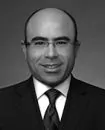As a federal prosecutor, Andrew S. Boutros prosecuted the two largest criminal customs and trade fraud cases in U.S. history. On December 15, one of those cases was profiled in the cover story of Bloomberg Businessweek. It is the second time that one of Boutros's cases has been profiled as Bloomberg Businessweek's cover story; the first occurred in 2013, which Businessweek described as "the largest food fraud in U.S. history."
Specifically, as an Assistant United States Attorney, Boutros successfully prosecuted Texas-based food broker, Jun Yang, who court documents described as "one of the largest and most successful criminal transshippers ever prosecuted in U.S. history."
From the article, "How Antibiotic-Tainted Seafood From China Ends Up on Your Table":
Homeland Security Investigations, a part of U.S. Immigrations and Customs Enforcement, first knew him as a honey broker. The agency arrested him in 2012 (then unarrested him so that he could cooperate with the investigation, then arrested him again) and charged him with making false claims about the honey he was selling. It was harvested in China but was passed through Malaysia, where it acquired Malaysian certificates of origin. This illegal transshipping, as the maneuver is called, allowed him to avoid paying almost $38 million in antidumping duties. The investigators untangled a network of shell companies that seemed designed solely to deceive U.S. regulators. In November 2013, Yang was convicted and sentenced to three years in federal prison.
The investigators also determined that Yang's main business wasn't honey—it was seafood. His company brokered shrimp for a Houston company called American Fisheries. At the time of Yang's first arrest, some of the shipments were still in cold-storage facilities. The feds required him, as part of his cooperation, to send samples to a laboratory for analysis. Five shipments tested positive for nitrofurans, a class of antibiotics banned in the U.S. Those tainted shrimp were eventually destroyed. All the tainted shipments had been labeled as products of Malaysia.
Despite Yang's cooperation with the government in the shrimp investigation, his information wasn't used to make a case. But American Fisheries itself may have provided a way to track the apparent transshipping scheme. In May 2013, American Fisheries sued Yang, saying it had received only $6.1 million of the $12.1 million Yang owed it for 74 shipments of shrimp, weighing as much as 28,000 kilograms (62,000 pounds) each, from June 2011 to January 2012. That case, still pending in Texas, as well as Yang's countersuit against American Fisheries, has uncovered a trove of documents that detail how a Shanghai-based company hatched a plan to get its Chinese-farmed shrimp into America.
You can read the full article here.
The content of this article is intended to provide a general guide to the subject matter. Specialist advice should be sought about your specific circumstances.


